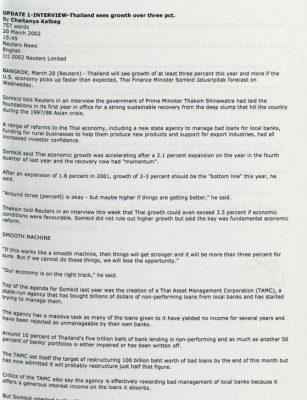Interview- Thailand sees growth over three pct
[Reuters]
Published date: 20th Mar 2002
20 March 2002
Reuters News
English
(c) 2002 Reuters Limited
BANGKOK, March 20 (Reuters) – Thailand will see growth of at least three percent this year and more if the U.S. economy picks up faster than expected, Thal Finance Minister Somkid Jatusripitak forecast on Wednesday.
Somkid told Reuters in an interview the government of Prime Minister Thaksin Shinawatra had laid the foundations in its first year in office for a strong sustainable recovery from the deep slump that hit the country during the 1997/98 Asian crisis.
A range of reforms to the Thal economy, including a new state agency to manage bad loans for local banks, funding for rural businesses to help them produce new products and support for export industries, had all increased investor confidence.
Somkid said Thai economic growth was accelerating after a 2.1 percent expansion on the year in the fourth quarter of last year and the recovery now had “momentum”.
After an expansion of 1.8 percent in 2001, growth of 2-3 percent should be the “bottom line” this year, he said.
“Around three (percent) is okay – but maybe higher if things are getting better,” he said.
Thaksin told Reuters in an interview this week that Thai growth could even exceed 3.5 percent if economic conditions were favourable. Somkid did not rule out higher growth but said the key was fundamental economic reform.
SMOOTH MACHINE
“If this works like a smooth machine, then things will get stronger and it will be more than three percent for sure. But if we cannot do these things, we will lose the opportunity.”
“Our economy is on the right track,” he said.
Top of the agenda for Somkid last year was the creation of a Thai Asset Management Corporation (TAMC), a state-run agency that has bought billions of dollars of non-performing loans from local banks and has started trying to manage them.
The agency has a massive task as many of the loans given to it have yielded no income for several years and have been rejected as unmanageable by their own banks.
Around 10 percent of Thailand’s five trillion baht of bank lending is non-performing and as much as another 50 percent of banks’ portfolios is either impaired or has been written off.
The TAMC set itself the target of restructuring 100 billion baht worth of bad loans by the end of this month but has now admitted it will probably restructure just half that figure.
Critics of the TAMC also say the agency is effectively rewarding bad management of local banks because it offers a generous interest income on the loans it absorbs.
But Somkid rejected such criticism and said any restructuring of bad loans by the TAMC should be seen as a success: “This is a very difficult job, but at least we have tried to do it.”
Somkid said Thai public debt was being controlled and would be kept within a target of 65 percent of gross domestic product.
Thai GDP was $114.6 billion last year, official data shows.
BALANCED BUDGET
“We have a projection for five to 10 years that we can keep the proportion of debt to GDP around 65 percent,” he said.
“This is the first year, this coming year, when we have reduced the deficit. If we continue like this, the budget will be balanced within five years.”
Somkid sald Thailand had nothing to fear from the rapid expansion of China in the future providing its companies produced a diversified portfolio of goods that other countries could buy.
“I consider China cooperative competition. They are a big market for us,” he said. “It is not a threat. When you are in business you cannot think your competitors are a threat.”
Thailand had to concentrate on its strengths such as tourism and encourage foreign companies to headquarter in the country.
“The portfolio of export products must be reformed,” he said.
“It is wrong that in the past 20 years every emerging market in Asia has been producing the same thing, exporting to the same export market. We end up with overcapacity … Each country should have some sort of differentiation of their product.”
Somkid said International investors were watching closely to see how Thailand pursued its agenda of economic reform.
“This year we have to do something seriously to show we are serious with the reform process,” he said.
“They are watching us to see if we are serious or not.” (With additional reporting by Andrew Browne and Chris Johnson).






